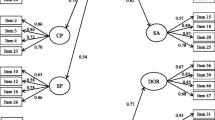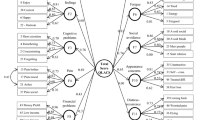Abstract
Background
With growing interest in cross-cultural and multicultural cancer-related quality of life studies, the need to assess reliability and validity of quality of life measures for linguistically and culturally diverse cancer survivors is pressing.
Methods
Reliability and validity of the English and Spanish versions of the Functional Assessment of Cancer Therapy (FACT)-G subscales were tested with a sample of English-speaking European American (n = 273) and ethnic minority American (n = 194), and Spanish-speaking Latina (n = 199) cervical cancer survivors in the U.S.
Results
Reliability coefficients (Cronbach’s alpha) were 0.76 or higher across ethnic/linguistic groups except for the emotional wellbeing subscale among Spanish-speaking Latinas (α = 0.64). Factor analyses demonstrated overall measurement equivalence across groups with some ethnic/linguistic variations: there were greater differences between linguistic groups than between ethnic groups. Additionally, the scale’s factor structure was less satisfactory for Spanish-speaking Latinas. The subscales had good concurrent validity with appropriate subscales of the Short Form (SF)-12 and Rand/SF-36 General Health subscale (Pearson’s r 0.53–0.66), suggesting each subscale was assessing its intended construct.
Conclusion
The overall psychometric properties of the FACT-G were cross-culturally equivalent. However, more validation studies are needed for non-English speaking populations particularly with emotional wellbeing. In addition, disaggregated analyses on linguistic groups are recommended unless cross-cultural equivalence is established.
Similar content being viewed by others
Abbreviations
- CCR:
-
California Cancer Registry
- CCS:
-
Cervical cancer survivors
- FACT-G:
-
Functional Assessment of Cancer Therapy-General
- HRQOL:
-
Health-related quality of life
- MCS:
-
Mental Component Summary
- PCS:
-
Physical Component Summary
- QOL:
-
Quality of Life
- SF:
-
Short Form
- SES:
-
Socioeconomic status
References
Kagawa-Singer, M. (2000). Improving the validity and generalizability of studies with underserved U.S. populations expanding the research paradigm. Annals of Epidemiology, 10, S92–S103.
Shumaker, S. A., & Naughton, M. J. (1995). The international assessment of health-related quality of life: A theoretical perspective. In S. A. Shumaker & R. A. Berzon (Eds.), The international assessment of health-related quality of life: Theory, translation, measurement and analysis (pp. 3–10). Oxford: Rapid Communication.
Stewart, A. L., & Napoles-Springer, A. (2000). Health-related quality of life assessments in diverse population groups in the United States. Medical Care, 38(9 Suppl II), II-102–II-124.
Herdman, M., Fox-Rushby, J., & Badia, X. (1998). A model of equivalence in the cultural adaptation of HRQOL instruments: The universalist approach. Quality of Life Research, 7, 323–335.
Cella, D. F. (1997). Manual of the Functional Assessment of Chronic Illness Therapy (FACIT) measurement. Evanston: Center on Outcomes, Research and Education (CORE).
Cella, D., Tulsky, D., Gray, G., et al. (1993). The Functional Assessment of Cancer Therapy scale: Development and validation of the general measure. Journal of Clinical Oncology, 11(3), 570–579.
Cella, D. F., Hernandez, L., Bonomi, A. E., et al. (1998). Spanish language translation and initial validation of the Functional Assessment of Cancer Therapy (FACT) quality of life instrument. Medical Care, 36(9), 1407–1418.
Lee, E.-H., Chun, M., Kang, S., & Lee, H.-J. (2004). Validation of the Functional Assessment of Cancer Therapy-General (FACT-G) Scale for measuring the health-related quality of life in Korean women with breast cancer. Japanese Journal of Clinical Oncology, 34(7), 393–399.
Yu, C. L., Fielding, R., Chan, C. L., et al. (2000). Measuring quality of life of Chinese cancer patients: A validation of the Chinese version of the Functional Assessment of Cancer Therapy-General (FACT-G) scale. Cancer, 88(7), 1715–1727.
Pandey, M., Thomas, B. C., Ramdas, K., Eremenco, S., & Nair, M. K. (2002). Quality of life in breast cancer patients: Validation of a FACT-B Malayalam version. Quality of Life Research, 11(2), 87–90.
Thomas, B. C., Pandey, M., Ramdas, K., Sebastian, P., & Nair, M. K. (2004). FACT-G: Reliability and validity of the Malayalam translation. Quality of Life Research, 13(1), 263–269.
Brady, M. J., Cella, D. F., Mo, F., et al. (1997). Reliability and validity of the Functional Assessment of Cancer Therapy-Breast (FACT-B) quality of life instrument. Journal of Clinical Oncology, 15, 974–986.
Gandek, B., Ware, J. E., Aaronson, N. K., et al. (1998). Cross-validation of item selection and scoring for the SF-12 Health Survey in nine countries: Results from the IQOLA Project. International Quality of Life Assessment, 51(11), 1171–1178.
Ware, J. E. & Sherbourne, C. D. (1992). The MOS 36-item short-form health survey (SF-36): I. Conceptual framework and item selection. Medical Care, 30(6), 473–483.
Hays, R. D., Sherbourne, C. D., & Mazel, R. M. (1993). The RAND 36-item health survey 1.0. Health Economics, 2(3), 217–227.
Ashing-Giwa, K., Padilla, G., Tejero, J., Kim, J. (2004). Breast cancer survivorship in a multiethnic sample: Challenges in recruitment and measurement. Cancer, 101(3), 450–465.
Kornblith, A. B., Herndon, J. E., Zuckerman, E., et al. (2001). Social support as a buffer to the psychological impact of stressful life events in women with breast cancer. Cancer, 91(2), 443–454.
STATA. (2000). STATA reference manual. College Station: STATA Press.
Nunnally, J. (1978). Psychometric theory. New York: McGraw-Hill.
Thomson, B. (2004). Exploratory and confirmatory factor analysis: Understanding concepts and applications. Washington, DC: American Psychological Association.
Chie, W. C., Chang, K. J., Huang, C. S., & Kuo, W. H. (2003). Quality of life of breast cancer patients in Taiwan: Validation of the Taiwan Chinese version of the EORTC QLQ-C30 and EORTC QLQ-BR23. Psycho-Oncology, 12(7), 729–735.
Wallston, K. A., Stein, M. J., & Smith, C. A. (1994). Form C of the MHLC scales: A condition-specific measure of locus of control. Medical Care, 30(6), 473–483.
Dapueto, J. J., Francolino, C., Servente, L., et al. (2003). Evaluation of the Functional Assessment of Cancer Therapy-General (FACT-G) Spanish Version 4 in South America: Classic psychometric and item response theory analyses. Health and Quality of Life Outcomes, 1, 32–43.
Fumimoto, H., Kobayashi, K., Chang, C. H., et al. (2001). Cross-cultural validation of an international questionnaire, the General Measures of the Functional Assessment of Cancer Therapy scale (FACT-G), for Japanese. Quality of Life Research, 10, 701–709.
Ness, R. B., Nelson, D. B., Kumanyika, S. K., & Grisso, J. A. (1997). Evaluating minority recruitment into clinical studies. Annals of Epidemiology, 7, 472–478.
Acknowledgements
Research supported by a grant from the California Cancer Research Program (#2110008).
Author information
Authors and Affiliations
Corresponding author
Additional information
All participants in this study have provided written informed consent as required by the University of California at Los Angeles Institutional Review Board.
Rights and permissions
About this article
Cite this article
Ashing-Giwa, K.T., Kim, J. & Tejero, J.S. Measuring quality of life among cervical cancer survivors: preliminary assessment of instrumentation validity in a cross-cultural study. Qual Life Res 17, 147–157 (2008). https://doi.org/10.1007/s11136-007-9276-3
Received:
Accepted:
Published:
Issue Date:
DOI: https://doi.org/10.1007/s11136-007-9276-3




